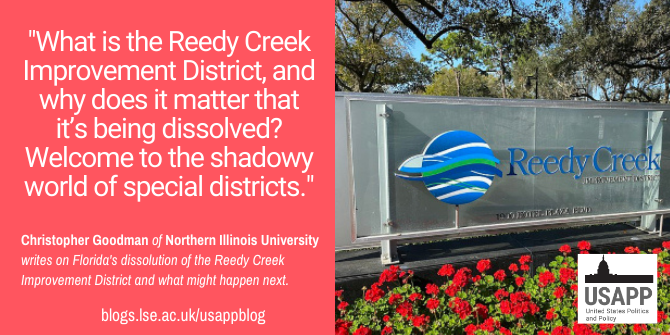 Following criticism from the Disney company over a controversial education bill, last week Florida’s Governor, Ron DeSantis signed legislation which would dissolve the Reedy Creek Improvement District, the location of the company’s Disney World Resort. Chris Goodman explains the history of the special district, how it has functioned, and the uncertainty around what may happen next.
Following criticism from the Disney company over a controversial education bill, last week Florida’s Governor, Ron DeSantis signed legislation which would dissolve the Reedy Creek Improvement District, the location of the company’s Disney World Resort. Chris Goodman explains the history of the special district, how it has functioned, and the uncertainty around what may happen next.
On April 22, Florida Governor Ron DeSantis signed legislation, dissolving the Reedy Creek Improvement District, effective June 1, 2023, apparently in reaction to the Disney corporation’s opposition to the state’s recently enacted Parental Rights in Education bill, which limits classroom instruction on gender identity and sexual orientation. The politics of this action notwithstanding, what exactly is going on and who is involved? What is the Reedy Creek Improvement District, and why does it matter that it’s being dissolved? Welcome to the shadowy world of special districts.
Let’s back up. In the United States, there are five main forms of local government. The first three are cities, counties, and in 27 states, town or townships are general purpose local governments. They provide many services, tax residents and levy fees, and issue debt to support infrastructure. They’re often the local governments that people identify with. The fourth are school districts. Finally, we have special districts. Typically, these local governments provide a single service to a fixed geographic area. They often have the power to tax (mostly property tax but sometimes other taxes too) or levy fees for services (like transit fares or water fees). Some special districts have the power to issue debt. The Reedy Creek Improvement District (RCID) in central Florida, and home to the Walt Disney World Resort, falls in this camp; however, in 1967 the state endowed the RCID with many more powers, powers generally associated with a city or county. These services are to the benefit of landholders, primarily the Disney Corporation and its subsidiaries, and are largely paid for by taxes and utility fees.

Credit: Asher Heimermann, CC BY-SA 4.0, via Wikimedia Commons
The RCID is responsible for services such as environmental planning, water control, roadway maintenance, emergency services, and water, sewer, and electrical utilities. If you think that these sound like many of the services a city provides, you would be correct. These services are supported by property taxes and utilities fees levied on the landowners inside the RCID. In effect, Disney taxes or charges itself to provide services it values.
The RCID is like another kind of special district in Florida, the Community Development District (CDD). CDDs exist primarily to facilitate the issuing of bonds to fund infrastructure development in new residential developments. They allow housing developers to put in roads, water pipes, sewer lines, and other things, pay for them with debt, and pay the debt off by charging an additional property tax to new homeowners. Rather than increase the purchase price of new housing, CDDs allow the cost of necessary infrastructure to be spread over time. CDDs differ from the RCID in a few important ways. CDDs are more limited in their ability to provide public services, and importantly, CDDs have a completely different governance structure. CDD’s governing board members are initially allocated by the amount of land an owner has in the district. As the primarily landowner, this is the developer. As homes are sold, board seats convert to popular election until the entire governing board comprises popularly elected members. The RCID is different in that landowners always control the board seats. As such, the Disney Corporation and its subsidiaries control the decisions made about service delivery and infrastructure within the district.
What next for the Reedy Creek Improvement District?
The RCID is dissolving in 2023. What now? The answer to this question is unclear. The legislation inserts a single paragraph into the Florida statutes and does little to explain how the dissolution will occur or what happens during the process. Undoubtedly, the law will be subject to litigation; however, the RCID, like all special districts in Florida, is subject to the The Uniform Special Districts Accountability Act, which outlines how independent special districts dissolve. This law specifies the debt and assets of a dissolving special district be transferred to a local general-purpose government, who assumes responsibility for paying off the debts and/or continuing to provide services. This likely means Orange (and possibly Osceola) County will have some responsibility for the transferred debt and assets.
Importantly, the tax levy that supports the RCID is also eliminated upon dissolution. Currently, the RCID taxes itself about double the average property rate of Orange County, FL. If Orange County assumes the debt, assets, and service delivery requirements of the RCID, it must do so with its own (lower) property tax levy. This could mean taxpayers county-wide will foot the bill in the form of future tax increases, or it might not.
Little about the process is known. Many of the actors in the process of dissolution have yet to be assigned their roles. The uncertainty of the process is the issue. If an implementation plan accompanied the dissolution, the responsible parties could react and plan for what happens on June 1, 2023. Right now, we’re left with many questions and few answers.
Please read our comments policy before commenting
Note: This article gives the views of the authors, and not the position of USAPP– American Politics and Policy, nor of the London School of Economics.
Shortened URL for this post: https://bit.ly/3ET0Fwi
About the author
 Christopher Goodman – Northern Illinois University
Christopher Goodman – Northern Illinois University
Christopher Goodman is an assistant professor of public administration at the Northern Illinois University. His research focuses on local public finance, local government management/urban policy, and intergovernmental affairs. His recent work appears in Public Budgeting and Finance, The American Review of Public Administration, Publius: The Journal of Federalism, State & Local Government Review, and Growth and Change.






